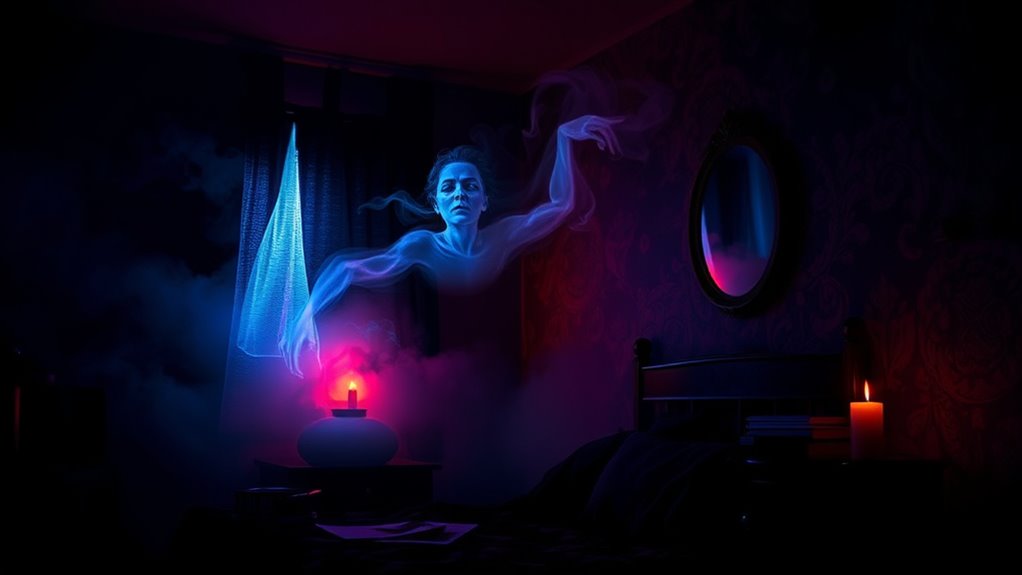Your emotional states influence the themes, tone, and intensity of your dreams. When you feel anxious or stressed, your dreams may feature chaos or confrontation, while feelings of happiness and calm often lead to peaceful, uplifting dreams. Recognizing how your daytime feelings shape your sleep experiences can give you insight into your emotional health. If you keep exploring, you’ll discover more about how managing emotions can transform your dreaming world.
Key Takeaways
- Emotional feelings during sleep influence dream themes, tones, and imagery.
- Anxiety or stress can lead to chaotic or confrontational dreams, while calm feelings foster peaceful dreams.
- Lucid dreaming allows conscious control over emotional scenarios, aiding emotional processing and regulation.
- Effective daytime emotional regulation reduces unresolved tensions, resulting in more balanced dreams.
- Dreams reflect emotional states, offering insights and opportunities for emotional growth and self-awareness.

Your emotional states profoundly influence the content and tone of your dreams. When you go to sleep feeling anxious, happy, or stressed, those feelings often seep into your dreams, shaping their themes and intensity. For example, if you’re overwhelmed by worries during the day, your dreams might feature scenes of chaos or confrontation, reflecting your inner turmoil. Conversely, feeling calm and content can lead to more peaceful, uplifting dreams. Recognizing this connection gives you a powerful tool for understanding your emotional health and even influencing your dreaming experiences. Incorporating healthy coping mechanisms during the day can help regulate your emotions and positively impact your dreams.
Lucid dreaming, the ability to become aware that you’re dreaming while still in the dream state, can be a valuable way to practice emotional regulation. When you’re lucid, you gain control over your dream environment, allowing you to confront fears or alter negative scenarios. For instance, if you’re experiencing a nightmare rooted in anxiety, becoming lucid gives you the chance to change the story, turn a menacing figure into a friendly one, or simply wake yourself up. This active engagement helps you process complex emotions in a safe space and can reduce the frequency of distressing dreams over time. By practicing lucid dreaming, you develop a stronger awareness of your emotional landscape, which in turn helps you manage those feelings better during waking hours.
Your ability to regulate emotions during the day can also influence how vividly or intensely your dreams unfold. When you’re skilled at emotional regulation, you’re less likely to carry unresolved tension into your sleep. This can lead to more balanced, less reactive dreams, where your subconscious isn’t overwhelmed by unresolved issues. Techniques such as mindfulness, meditation, or journaling before bed can improve your emotional regulation, making your dreams less volatile and more reflective of your calm state. Over time, this consistency helps you gain better insight into your emotional patterns, revealing underlying concerns that might otherwise go unnoticed.
In essence, your emotional states act as a blueprint for your dreams. By consciously working on emotional regulation and exploring lucid dreaming, you can influence the way your subconscious processes your day-to-day feelings. This not only enhances your understanding of yourself but also empowers you to create more meaningful, controlled dream experiences. Recognizing the deep link between your emotions and dreams allows you to harness your dreams for emotional growth and healing, making each night an opportunity for self-discovery and balance.
Frequently Asked Questions
Can Emotional States Influence Dream Recall Frequency?
Yes, your emotional states can influence how often you recall dreams. When you experience strong emotions, the emotion-memory connection strengthens, making it easier to remember dreams associated with those feelings. High emotional intensity, especially in positive or negative situations, boosts dream recall because your brain prioritizes emotionally charged memories. So, if you’re feeling intense emotions before sleep, you’re more likely to remember your dreams upon waking.
Do Positive Emotions Lead to More Vivid Dreams?
Positive emotions act like a bright sun, illuminating your dreams with vivid colors. When you’re in a good mood, your emotional memory becomes more active, creating richer dream symbolism. You might notice your dreams are more detailed and lively, reflecting your happiness. This emotional glow fuels your subconscious, making your dreams not just vivid but also more meaningful, helping you process your positive feelings in a powerful, colorful way.
How Do Anxiety Levels Affect Dream Content?
When your anxiety levels are high, your dreams often become filled with intense symbolism and emotional triggers. You might notice unsettling dream themes or recurring symbols that reflect your worries. Anxiety amplifies emotional triggers, making your dreams more vivid and emotionally charged. These dreams serve as subconscious messages, helping you process stress. By paying attention to dream symbolism, you can gain insight into your emotional state and work towards reducing anxiety.
Can Practicing Emotional Regulation Alter Dream Patterns?
Think of your mind as a garden; practicing emotional regulation helps you prune weeds and nurture blooms. By cultivating emotional awareness, you can influence your dreams, changing their symbolism and themes. When you actively manage your feelings, you steer your subconscious away from chaos, leading to more peaceful dreams. Yes, your efforts in emotional regulation can gently reshape your dream patterns, transforming nighttime visions into reflections of calm and clarity.
Are There Cultural Differences in Emotional Dream Interpretations?
Yes, cultural differences markedly influence emotional dream interpretations. You might see cultural symbolism in dreams that reflect your background, shaping how you understand your emotional experiences. Different cultures attach unique meanings to symbols and scenarios, affecting your perception of dreams. Recognizing these cultural influences helps you interpret your dreams more accurately, understanding the emotional messages they convey through your personal and cultural lens in the domain of dream interpretation.
Conclusion
As you drift into sleep, your emotional state directly influences your dreams. If you’re feeling anxious, you might dream of being chased; if happy, you could find yourself soaring freely. Remarkably, studies show that nearly 80% of people experience dreams tied to their daytime emotions. So, next time you wake up feeling a strong emotion, remember—it’s your mind’s way of processing what you’re experiencing. Embrace your dreams—they reveal your inner world.









